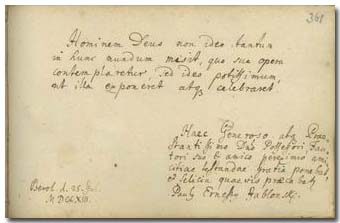
Hominem Deus non ideo tantum in hunc mundum misit, quo sua opera
contemplaretur, sed ideo potissimum, ut illa exponeret atque
celebraret.
Haec Generoso atque Praestantissimo D[omi]no Possessori, Fautori
suo & amico pereximio amicitiae testandae gratia ponebat, et
felicia quaevis praecabatur
Paulus Ernestus Jablonski
Berol[ini] d. 25. Jul. MDCCXIII. |
|
God placed man in the world not only in order he would contemplate
His works, but also in order he would understand and praise them.
I wrote this as a token of my friendship to the
noble and outstanding owner [of this album], my protector and
eminent friend, wishing him all the best
Paul Ernest Jablonski
In Berlin, on July 25, 1713.
|
p. 361. Berlin, July 25, 1713
Jablonski, Paul Ernst
(1693-1757), German orientalist,
Reformed theologian
Paul Ernst Jablonski was born in Berlin on
December 28, 1693, the son of the court pastor and theologian Daniel Ernst Jablonski
(1660-1741). He studied in Berlin, in the high school of
Joachimstal, then at the university of Frankfurt an der Oder,
where he mastered among others the Coptic language from
Maturin Veyssière la Croze (1661-1739). His work Disquisitio de
lingua Lycaonica published in 1714 well attested his
comprehensive knowledge of languages. Thanks to this, he obtained
royal support for a three years long journey to Germany, France,
the Netherlands and England. In 1720 he returned home and became a
pastor in Liebenberg (Mittelmark). In 1721 he was a professor of
philology and an extraordinary professor of theology in Frankfurt
an der Oder, as well as the pastor of the Reformed community;
from 1727 doctor and ordinary professor of theology. In 1741 he
applied for an exemption from pastoral duties, and from that time
on he only dedicated himself to scientific activity. He was
admitted to the Academy of Science of Berlin. He died on September
13, 1757. Besides his exegetic works, church history and dogmatic
treatises, his most important accomplishment were his works on
Coptic language and monuments, and their application on the
linguistic and archaeologic problems of the Old Testament. He also
wrote an apology for Nestorians. Some of his most important works: Exercitatio
historico-theologica de Nestorianismo … Berlin, 1724. –
Remphah Aegyptiorum deus ab Israelitis in deserto cultus …
Frankfurt a.d.O, Leipzig, 1731. – Pantheon Aegyptiorum sive de
diis eorum commentarius … Frankfurt a.d.O, 1750, 1752. 3
partes. – De Memnone Graecorum et Aegyptiorum huiusque
celeberrima in Thebaide statua syntagmata III. Frankfurt
a.d.O., 1753. – Institutiones historiae Christianae antiquioris.
Frankfurt a.d.O, 1754.
The father of
Paul Ernst Jablonski, the Berlin court preacher Daniel Ernst J.
had written earlier in the album (p. 121).
•
ADB • Jöcher-Adelung • Meusel • Michaud • PSB X 255 |

